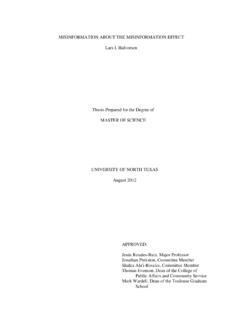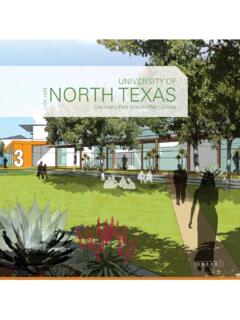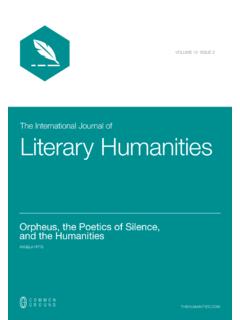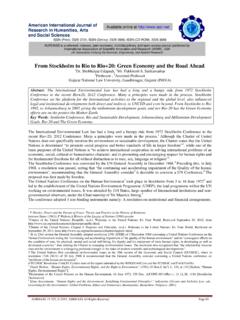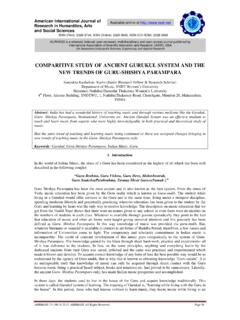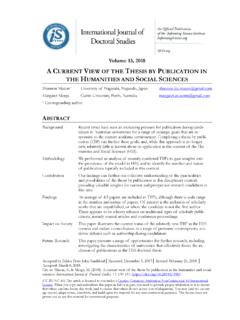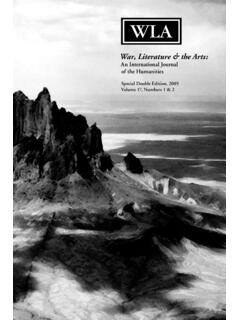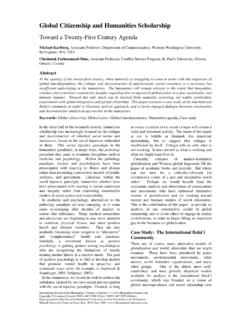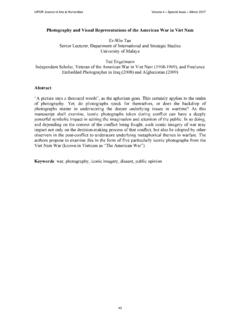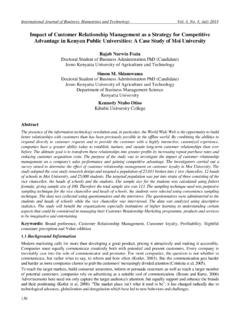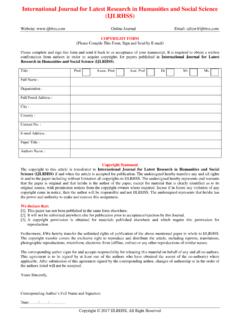Transcription of International Journal of the Humanities Volume 2, Number 3
1 International Journal of the Humanities Volume 2, Number 3 Article: HC04-0265-2004 Image of the Future in Russian CommunismNarratives of the Collective Representations in the 1920s inthe USSROlga Velikanova, Resident Fellow, Centre for Russian and East EuropeanStudies, University of Toronto, Canada International Journal of the Humanities Volume 2, Number 3 This paper is published at a series imprint of First published in Australia in 2004-2006 by Common Ground Publishing Pty Ltd at Selection and editorial matter copyright Common Ground 2004-2006 Individual papers copyright individual contributors 2004-2006 All rights reserved.
2 Apart from fair dealing for the purposes of study, research, criticism or review as permitted under the Copyright Act, no part of this book may be reproduced by any process without written permission from the publisher. ISSN 1447-9508 (Print) ISSN 1447-9559 (Online) The International Journal of the Humanities is a peer-refereed Journal published annually. Full papers submitted for publication are refereed by the Associate Editors through an anonymous referee process. Papers presented at the Second International Conference on New Directions in the Humanities , Monash University Centre in Prato, Italy, 20-23 July 2004.
3 Editors Tom Nairn, The Globalism Institute, RMIT University, Australia. Mary Kalantzis, Dean, Education, Language and Community Services, RMIT University, Melbourne. Editorial Advisory Board of the International Journal of the Humanities Juliet Mitchell, Cambridge University, UK. Paul James, Globalism Institute, RMIT University, Australia. Krishan Kumar, University of Virginia, USA. David Christian, San Diego State University, California, USA. Giorgos Tsiakalos, Aristotle University of Thessaloniki, Greece. Gayatri Chakravorty Spivak, Columbia University, USA.
4 Mick Dodson, Australian National University, Canberra, Australia. Jeffrey T. Schnapp, Stanford Humanities Laboratory, Stanford University, USA. Nikos Papastergiadis, The Australian Centre, University of Melbourne, Australia. Bill Kent, Monash Centre, Prato, Italy. Felicity Rawlings-Sanaei, Global Movements Centre, Monash University, Australia. Chris Ziguras, The Globalism Institute, RMIT University, Australia. Eleni Karantzola, Department of Mediterranean Studies, University of the Aegean, Greece. Bill Cope, Common Ground, Australia.
5 International Journal of the Humanities , Volume 2, Number 3 Copyright Common Ground ISSN 1447-9508 (Print) ISSN 1447-9559 (Online) Paper presented at the Second International Conference on New Directions in the Humanities , Monash University Centre in Prato, Italy, 20-23 July 2004 Image of the Future in Russian Communism Narratives of the Collective Representations in the 1920s in the USSR Olga Velikanova, Resident Fellow, Centre for Russian and East European Studies, University of Toronto, Canada Abstract Representations of the future are part of any worldview.
6 In opposition to the Christian notion of the Apocalypse, the Enlightenment paradigm suggested the idea of a bright future. In the beginning of the 2 Oth century, many people all over the world were under the impression that freedom and justice existed in the world and that imperfection could be overcome through social and technical progress. Faith in Progress was one of the most effective consolations for humans affected by fears of modernization. This global upsurge of utopian hopes and faith in progress was embodied in the anticipation of a socialist miracle.
7 In socialist myth the value of the future was strongly emphasized. My paper studies the parameters of the Communist concept of the bright future in opposition to the liberal ideologies collective (rather than individual) salvation, the narrative of sacrifices, and short-term orientation. This paper will use new archival documents to study popular visions of the socialist future, including abundance, brotherhood, love and equity. Keywords: Representations, Communism, Russia, Future, Popular visions * I owe my debt to Jeffrey Brooks who read and commented on the manuscript and gave me encouragement.
8 The work has greatly benefited from the discussion at the workshop at the University of Toronto Soviet Real Socialism in April 2003 and then at the International conference New Directions in the Humanities , University of Prato, Italy, 2003. Representations of the future are part of any worldview. In opposition to the Christian notion of the Apocalypse, the Enlightenment paradigm suggested the optimistic idea of a bright future. The beginning of the 2 Oth century saw global upsurge of utopian hopes and faith in progress, which was embodied in the anticipation of a socialist miracle.
9 In socialism the value of the future was strongly emphasized. My paper studies the parameters of the Communist concept of the bright future in opposition to the liberal ideologies collective (rather than individual) salvation, the narrative of sacrifices, and short-term orientation, and how they resonated to the popular imagination. I use new archival documents to study popular visions of the socialist future. These popular visions from below provide new dimensions to the elitist and official futurism revealed in contemporary science fiction and artistic futurist/constructivist projects, as well as in social experimentation and scientific experiments.
10 Traditional Russian peasants beliefs in a promised land and earthly paradise1 were reinforced by 1 K. V. Chistov, Russkaya Narodnaya Utopia: Genesis i Funktsii Sotsialno-Utopicheskikh Legend, Saint-Petersburg, 2003; S. Brouwer, Russian Medieval Concepts of Paradise, in Paradise Interpreted. Representations of Biblical Paradise in Judaism and Christianity, ed. By , Brilleiden, Boston, Koln, 1999. The Paradise Myth in Eighteenth-Century Russia.



